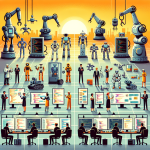As industries rapidly evolve in the wake of technological advancements, particularly in automation, the demand for skilled professionals has surged. Industrial automation stands at the intersection of engineering, technology, and manufacturing, offering a wealth of opportunities for those looking to future-proof their careers. Here, we explore the top skills essential for aspiring professionals in this dynamic field.
Understanding Industrial Automation
Industrial automation involves using control systems, such as computers or robots, to handle different processes and machinery in an industry to substitute human intervention. This transformation leads to improved efficiency, reduced costs, and enhanced productivity, making it vital for industries ranging from manufacturing to logistics.
1. Technical Proficiency in Automation Tools
To thrive in industrial automation roles, familiarity with various automation tools and software is crucial. Key tools include:
- Programmable Logic Controllers (PLCs): Ability to program and troubleshoot PLCs is fundamental, as they are the backbone of automation systems.
- Supervisory Control and Data Acquisition (SCADA): Knowledge in SCADA systems for monitoring and controlling plant processes is essential for operational efficiency.
- Robotics: Understanding robotic systems, including programming and maintenance, is highly advantageous as robotic applications increase in manufacturing.
2. Data Analysis Skills
The ability to analyze and interpret data generated by automated systems is vital. Proficiency in:
- Data Analytics Software: Familiarity with tools like Python, R, and specialized data visualization software can help in making informed decisions based on system performance data.
- Statistical Analysis: Understanding statistical principles to draw insights from data can significantly enhance operational strategies.
3. Cybersecurity Awareness
As automation involves extensive connectivity, knowledge of cybersecurity measures is becoming increasingly important. Skills in:
- Network Security: Understanding how to protect automation systems from cyber threats is critical to ensure operational integrity.
- Risk Assessment: Being able to identify and mitigate risks associated with automation systems can safeguard company assets and maintain trust.
4. Interdisciplinary Knowledge
Industrial automation isn’t confined to engineering alone. It often requires a blend of knowledge across various disciplines including:
- Mechanical and Electrical Engineering: A solid foundation in these areas is essential for understanding how automated systems operate and interact.
- Industrial Design and Ergonomics: Recognizing how design impacts usability and functionality helps in creating efficient working environments.
5. Soft Skills: Communication and Teamwork
While technical skills are crucial, soft skills should not be overlooked. Effective communication and teamwork are imperative in collaborative environments where engineers, operators, and management work together. The ability to:
- Communicate Complex Ideas Clearly: This is essential for conveying technical details to non-technical teammates or stakeholders.
- Collaborate Across Functions: Working seamlessly in multidisciplinary teams helps in implementing automation strategies effectively.
6. Adaptability and Continuous Learning
The pace of technological change means that adaptation is key. Professionals in industrial automation must embrace:
- Lifelong Learning: Engaging in continuous education through courses, certifications, and workshops helps in staying current with advancements in automation technologies.
- Curiosity and Innovation: Being open to experimenting with new technologies fosters a culture of innovation, crucial for driving automation initiatives.
7. Project Management
Project management skills are increasingly valuable, allowing professionals to lead automation projects effectively. Knowledge of:
- Agile Methodologies: Familiarity with agile principles can help manage projects in a fast-paced environment.
- Budgeting and Resource Allocation: Understanding how to allocate resources efficiently ensures projects stay on track and within budget constraints.
Conclusion
As industrial automation continues to reshape the future of work, equipping yourself with these critical skills can significantly enhance your career prospects. By focusing on technical proficiency, data analysis, cybersecurity, and interpersonal skills, and by fostering a mindset of adaptability and continuous learning, you can successfully navigate the challenges and opportunities in this evolving field. Embracing these competencies will not only future-proof your career but also position you as a valuable asset in the industrial landscape transforming the global economy.




